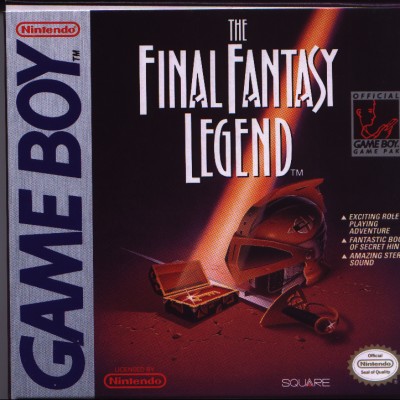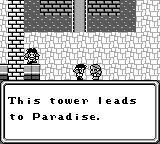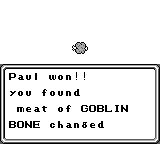|
|

|
BATTLE SYSTEM
|

|
INTERACTION
|

|
ORIGINALITY
|

|
STORY
|

|
MUSIC & SOUND
|

|
VISUALS
|

|
CHALLENGE
|
Unbalanced
|
COMPLETION TIME
|
8-15 Hours
|
|
OVERALL
2.0/5
|
Rating definitions
|
|
|
In 1989, Square, having made decent headway into the gaming industry with their fabled Final Fantasy series, decided to produce a different kind of RPG entitled Makaitoushi SaGa for the Gameboy, the very first installment of their SaGa series, rightfully considered by many to be the company's black sheep. Square's American branch, knowing back then that no one would play an RPG without the two magical words Final Fantasy, decided to localize the game as Final Fantasy Legend. The game certainly has much going for it, although deeply flawed implementation of its ideas ruins what potential the game had.
The battle system, for starters, has many interesting features. After starting a new game, players can choose a protagonist of three different races: human, mutant, and monster, after which they can recruit three allies of the aforementioned races at a guild. Random battles are turn-based, with each character choosing an equipped weapon, item, or skill to use, and both sides executing their commands. One problem here is that you have to use an item unless a character has none to use, with everything having a certain number of uses before running out. Although inns can recover skill use points, weapons and items disappear after all their durability points are gone with no chance for repair.
After a battle, your party gains money, although there is no experience system of which to speak. Rather, players must build their party's stats through various means. For humans, there exist at shops a number of consumable items that can increase maximum HP, strength, and agility. As for mutants, their stats increase the more players fight, and their skill setups change constantly, as well. Unfortunately, the game leaves players completely clueless as to how exactly their mutants' skills and stats change after battle, and it's easy, as well, to lose a useful mutant skill, although players can merely reset the game and hope they don't lose it again in battle.
 What a load of crap.
What a load of crap.
|
|
Monsters, moreover, can't equip items and weapons like humans and mutants, instead having fixed skill sets. Enemies occasionally drop meat monsters can eat after battle, which transforms them into different forms. However, the game doesn't let players know how their monsters will transform before devouring meat, though again, players can reset if the transformation isn't for the better, which is nonetheless an inconvenience.
The biggest issue with battles, however, is how grossly unbalanced they can become. I actually found many bosses to be easier than normal enemies, and though I found myself trying to escape battles at many points, the run option almost never works. Other annoyances chipping away at the battle system include the fluctuating encounter rate and the fact that the game makes you travel for long times without being able to get back to a town to recover and shop. Granted, there are occasional recovery pools throughout the game, though they sadly don't recover mutant and monster skill durability like inns. Ultimately, the battle system is a giant ball of wasted potential.
Another issue contributing to the failure of the battle system is interaction. Aside from a spotty translation restricted by small textboxes, among the biggest failures is the meager limit on inventory space outside of battle, with the need to discard items constantly just to open treasure chests being nothing short of infuriating, alongside the awful dungeon design at times and poor spacing of towns throughout the game. A spell to warp between towns would've been welcome, with the closest thing coming close to this being an item that regrettably teleports you to the very bottom of the game's lengthy tower. Granted, you can save your game anywhere, although there's only one slot for saving, and players can easily find themselves literally stuck when far from a town and low on supplies and health. Overall, this is what an interface should never be in an RPG.
On a positive note, there was no other RPG quite like Final Fantasy Legend in its time, but with good reason, chiefly its unique battle system that's mostly torture to play.
 Proper grammar? What's that?
Proper grammar? What's that?
|
|
The story is also unique, involving a mysterious tower connecting many different worlds. Even this potential, however, goes to waste, with few meaningful cutscenes throughout the game, rancid pacing, very little character development, and so forth, all of which, of course, a story should never be.
Some of the music is actually pretty good, though, albeit highly repetitive, alongside little diversity in sound effects.
While it's difficult to judge the merits of monochrome Gameboy visuals, FFL's graphics honestly aren't much to write home about, with heavily-recycled character and monster sprites and no indicative scenery in battles, where monsters are also inanimate. Their designs, though, are actually passable (aside from zombies that actually look like they're stripping), but the graphics leave plenty of room for improvement in the end.
Finally, FFL is mercifully short, taking anywhere from eight to fifteen hours to finish, and though the potential of tinkering with various setups of races would theoretically add replay value, the game's tortuous nature will easily make it become a paperweight. Final Fantasy Legend, given its uniqueness, ultimately showed great potential, although it contains a number of issues that more development time, and especially testing, would've easily solved. It's amazing, then, that the SaGa series has since grown significantly, with Square perhaps courting the most masochistic gamers time and again.
Review Archives
|









